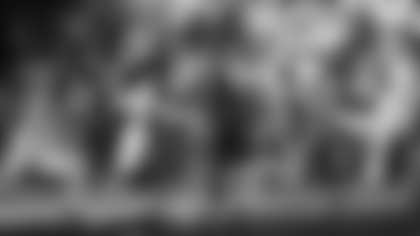Let's get to it . . .
Jerry from San Antonio, TX:
John, I see where Laurent Robinson wonders if he'll play football again? Thoughts?
John: My thoughts are Jaguars wide receiver Laurent Robinson – like a lot of NFL players these days – is struggling with the issue of concussions, an issue that continues to be a tricky, significant one to many players. In an NFL Network piece last week, Robinson said that after four concussion-related incidents last season he has been told by the team to stay home and "rest his brain." He also raised the issue of whether he'll play in 2013 or beyond. This, of course, has become a similar story to former Jaguars linebacker Clint Session, who sustained multiple concussions in 2011 and did not return to the Jaguars last season before his late-season release. Is there a possibility this could be Robinson's path? Apparently so, but with so much unknown about concussions it's really impossible at this point to accurately, confidently predict a long-range scenario. I'd be a bit surprised at this point if Robinson played this season. I'd also guess that the Jaguars pursue a third receiver in some capacity, with the idea that they'd be thrilled to get production from Robinson in that spot, but would be pleasantly surprised if it happens. But all of that's a guess and not coming from any team officials with knowledge of the situation, so we'll see where that goes. I also received some questions about what happens to Robinson's salary if he doesn't play again. The team paid Robinson an $8 million signing bonus with $13.8 million guaranteed and a $1 million salary last season, but they would not be responsible for anything after that if he opts not to play again. Essentially, the signing bonus acts as a player's guaranteed money in the NFL these days. The signing bonus would remain on the Jaguars' salary cap on a prorated basis, but he wouldn't cost any more real cash.
Nick from Annapolis, MD:
John, you sound sort of frustrated. Is everything all right? Do you need someone to talk to? I just want to make sure you know I'm here for you, buddy.
John: Who are you? Get out of my car.
Freamon from Jacksonville:
Do you think Gus Bradley wants a conventional quarterback who stands in the pocket and takes shots or a quarterback that has much athleticism? In my perception, I find that some of the best quarterback are dual threats. I really feel that the pocket passer is overrated and if they don't have the offensive line and receivers, all they have is their arm. They don't run. Dual threats make plays when they can't find the open receiver. What do you think?
John: I'm on record pretty strongly that I believe in the pocket passer. It's quite possible that I'm prejudiced from a decade of covering Peyton Manning, and seeing him and Tom Brady have extended runs of success passing from the pocket. Whereas you believe that the best quarterbacks are dual threats because they can run if they can't find the open receiver, I believe the best quarterbacks find the open receive far more than they don't, and that their intelligence and command of an offense can make them far more effective than the quarterback who can run. When you couple that with the injury risk and longevity (or lack thereof) associated with running quarterbacks, I believe the best way to build a long-term successful franchise is to have a quarterback who can run the offense from the pocket and be available game in, game out, year in, year out. The emergence of players such as Robert Griffin III and Colin Kaepernick is challenging that theory in the short-term. If they can be successful for the long-term, then perhaps this belief that I just laid out in this answer might correctly be perceived as the belief of an aging sportswriter too set in his ways to see an emerging trend. If so, that's OK. I'm wrong a lot. It's a comfortable place for me. But for now, I'm a pocket-passer guy.
Jody from Corpus Christi, TX:
So what lit up the sign on Memorial Day?
John: This is in reference to what caused the large, neon "O-Zone" sign in my living room light up on Memorial Day. I made a comment that the sign only lit up when I did something to impress my 16-year old son. I gave him money. Why, is there something else that works?
Dave from New Philadelphia, OH:
I believe between the lockout and the regime changes Gabbert has gotten a raw deal from these series of events. We've seen that he is capable of being a good NFL quarterback and I just don't want to see the kid fail. Do you see him having the support from the new staff he needs to improve and excel?
John: I believe Gabbert will get a fair opportunity from the new staff. At the same time, the onus will be on him to immediately show he has the ability to grow and develop, and yes, that likely will mean less leeway than existed with previous regimes. One reason for that is because Gene Smith drafted Gabbert and David Caldwell did not, so there is no preexisting belief about Gabbert's potential. But more than that, Gabbert is now two years into this process. Whereas in Years 1 and 2 there could be an element of waiting for him to mature, grow or gain experience, it's reasonable to expect there to be less of that and to be more performance and obvious improvement. I, like you, believe that Gabbert entered the NFL in difficult circumstances and had to play through a lot the first two seasons. At the same time, with a new general manager and new head coach, it's logical to assume they will want to see immediate growth and production from such a critical position.
Daniel from Johnston, IA:
You've mentioned before that certain line positions such as guards don't merit a top 10-15 pick. To me, a solid offensive line is well worth the pick. I've seen some very average backs (quarterbacks and running backs) look pretty incredible behind a good line. If you don't feel there's a superstar quarterback out there, why not draft some quality "sure bets" for the O line?
John: It's simply a matter of how much you believe certain positions will truly impact the roster. The prevailing belief in the NFL is there is minimal difference between say, a player rated as a "10" as an offensive guard and a "5" in terms of how that player will help your team on the field. The difference between a "10" and a "5" at other positions such as quarterback, defensive end or even left tackle is significantly greater, with the thought being you can find a guard in the second or third round to impact your team almost the same as a guard taken in the first round.
Joel from Atlanta, GA:
Just remember O-man, when Shad is walking down the hall and you're moving to take that afternoon nap under your desk, you gotta creep. Creep.
John: Joel, you insult me. I need advice on many, many things. How to creep for the afternoon nap . . . well, let's just say I got this one covered.
Joseph from Statesboro, GA:
Why is it that quarterbacks get hurt running the ball and running backs don't?
John: They do. That's the entire point. And even if running backs don't sustain injuries that force them to miss games, they take such a physical beating that the amount of time they can be expected to be productive is far shorter than a quarterback. Remember, Fred Taylor and Peyton Manning were drafted in the same year. Taylor's last productive season was 2007. Manning has won two Most Valuable Player awards since, and is in consideration for a third this season.
Andrew from Panama City, FL:
snicker*...you said duty..(tee hee)
John: Heh.
Don from Ponte Vedra Beach, FL:
What needs to be evaluated from last year? What phase of the game did they do anything consistently good? What could anyone want to learn about last year? It was so bad that it's a waste of time to even try to figure it out. Take all that film and all that work and throw it out. The day of moral victory is over. There are too many things to do going forward to worry about the past.
John: This is not an uncommon sentiment from fans, but while the season was indeed frustrating and disappointing, David Caldwell and Gus Bradley would be irresponsible to simply burn the tape and move on. Their task in evaluating last season is not to decipher if the team was good, or if there were good feelings to be gleaned by anything that occurred on the field. Their jobs instead are to evaluate the roster to determine which players should be kept for next season and which players could possibly be part of the core in 2013 and beyond. Certainly there will be much change in these areas, but at the same time there are resources on the roster and there is talent. The first step for Bradley and Caldwell is to determine what's here, then determine what needs to be added to that to start building the foundation for the future.
Johnny from East Palatka and Section 141:
Yeah, so I went outside on Saturday morning, saw my shadow. You know what that means..."Why am I awake early enough to see my shadow?!" Sheesh.
John: Yeah, that was a bad decision that unfortunately you can't redo. Sleep, my good friend, sleep.
Jaguars News | Jacksonville Jaguars - jaguars.com
Feb 03, 2013 at 01:06 AM
This article has been reproduced in a new format and may be missing content or contain faulty links. Please use the Contact Us link in our site footer to report an issue.













